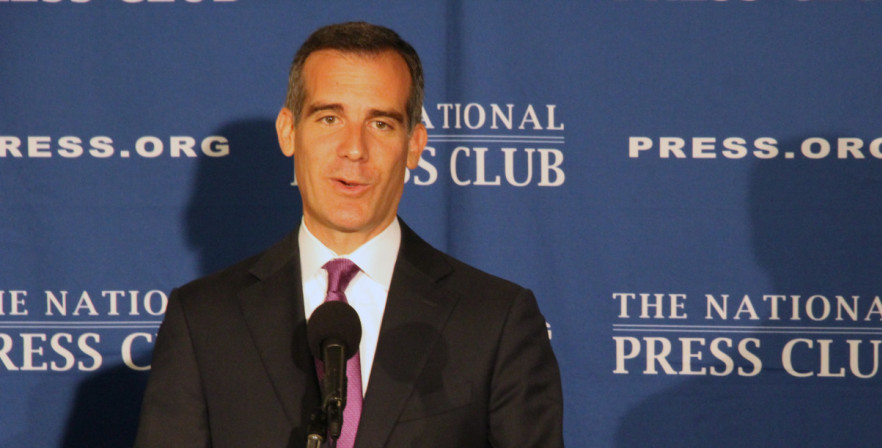WASHINGTON — Los Angeles Mayor Eric Garcetti said Wednesday that his city’s recent decision to increase the minimum wage to $15 an hour over the next five years will lift 600,000 LA-area earners out of poverty.
“In my city, where one out of four people live in poverty, we have a shot at putting that money back on Main Street,” Garcetti said at news conference at the National Press Club in Washington, DC.
But some economists have found the connection between a higher minimum wage and a lower poverty rate to be lacking.
“It’s misreading a large body of evidence,” said David Neumark, the director for the Center for Economics and Public Policy at the University of California, Irvine, just south of Los Angeles. “It’s actually way more likely that there will be dis-employment effects.”
Neumark says although raising the minimum wage targets those making low wages, the redistribution of wealth doesn’t hit large corporations. Instead, small and midsize businesses, such as family-owned restaurants and hotels, are the ones that get hit.
“It’s a strange redistribution scheme,” Neumark said in a telephone interview. He said higher labor costs inevitably lead to higher prices for consumers.
“When the demand curves slope downward, especially for goods, businesses face a little less demand,” he said.
In California, Los Angeles County surveyed 1,000 businesses that would be affected by the higher minimum wage. The mayor said the survey found that nearly 45 percent expected to be forced to raise prices and to direct staff to take on additional duties.
When these workers see increased pay, the mayor said, many are still not at the point where they can put that money into savings.
“They do other things,” he said. “They’ve been choosing between paying the bill and buying those shoes for their kids for school. You’ll see that money at businesses.”
A coalition of over 130 local Los Angeles restaurant owners formally opposed the change in March. Citing already high labor costs, the group called for carve-outs for small businesses.
“I don’t support that,” Garcetti said, referencing the broader issue of making exceptions. “I think a minimum wage should be a minimum wage. There should be nobody who earns underneath that.”
The mayor did say that what works for Los Angeles — raising the minimum wage to $15 an hour from $9 an hour — isn’t necessarily the right formula for other cities. With differing costs of living and varying economies, each city needs to find its own threshold.
“I do think it would be great to raise the basement nationally, but we’re not seeing that happen any time soon,” Garcetti said.
Democrats in Congress have pushed to raise the national $7.25 minimum wage for several years, but Republican majorities in the House and Senate have not budged.
Los Angeles is just the latest of a number of U.S. cities to increase the minimum wage, following Seattle, San Francisco and Chicago. California is set to increase its statewide minimum wage to $10 an hour by 2016.


